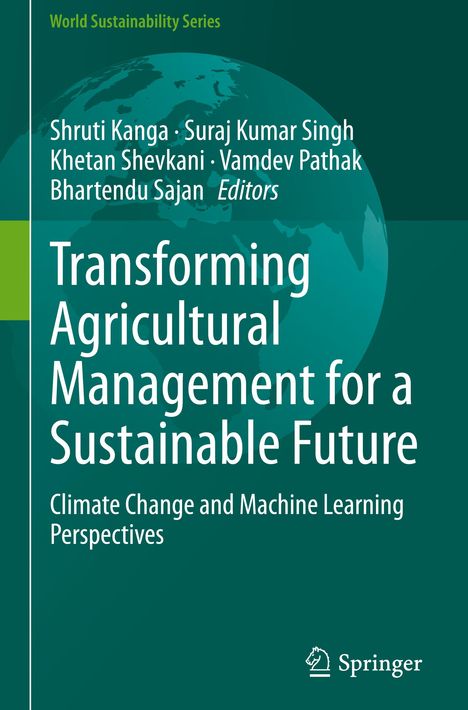Transforming Agricultural Management for a Sustainable Future, Gebunden
Transforming Agricultural Management for a Sustainable Future
- Climate Change and Machine Learning Perspectives
(soweit verfügbar beim Lieferanten)
- Herausgeber:
- Shruti Kanga, Suraj Kumar Singh, Bhartendu Sajan, Vamdev Pathak, Khetan Shevkani
- Verlag:
- Springer International Publishing, 08/2024
- Einband:
- Gebunden, HC runder Rücken kaschiert
- Sprache:
- Englisch
- ISBN-13:
- 9783031634291
- Artikelnummer:
- 11939713
- Umfang:
- 312 Seiten
- Nummer der Auflage:
- 2024
- Ausgabe:
- 2024
- Gewicht:
- 635 g
- Maße:
- 241 x 160 mm
- Stärke:
- 23 mm
- Erscheinungstermin:
- 7.8.2024
- Hinweis
-
Achtung: Artikel ist nicht in deutscher Sprache!
Klappentext
"Transforming Agricultural Management for a Sustainable Future: Climate Change and Machine Learning Perspectives" is an essential read for anyone interested in the future of agriculture and the role that technology can play in mitigating the impact of climate change. The book delves into the challenges facing agriculture today, such as climate change, soil degradation, and water scarcity. It then explores how machine learning can be used to overcome these challenges and promote sustainable agricultural practices.
One of the key takeaways from the book is the importance of data-driven decision-making in agriculture. With the help of machine learning algorithms, farmers can analyze vast amounts of data, such as weather patterns, soil quality, and crop yields, to make informed decisions about planting, irrigation, and fertilizer use. By using this data, farmers can optimize their yields while minimizing their impact on the environment.
Another important aspect of the book is its focus on climate change. Agriculture is one of the largest contributors to greenhouse gas emissions, and farmers are already feeling the impact of climate change through droughts, floods, and other extreme weather events. The book provides a comprehensive overview of the ways in which machine learning can be used to reduce the impact of agriculture on the environment, such as by optimizing irrigation and reducing fertilizer use.
The book also explores the role of technology in promoting sustainable agriculture practices. For example, precision agriculture techniques, such as GPS-guided tractors and drones, can help farmers reduce waste and improve crop yields. The book provides examples of how these techniques are already being used in practice, and how they can be further developed to promote sustainability.
Overall, "Transforming Agricultural Management for a Sustainable Future: Climate Change and Machine Learning Perspectives" is an insightful and informative read for anyone interested in the future of agriculture. The book provides a comprehensive overview of the challenges facing agriculture today and the ways in which technology can be used to overcome these challenges and promote sustainable practices. It is a must-read for farmers, policymakers, and anyone interested in the future of our planet.


